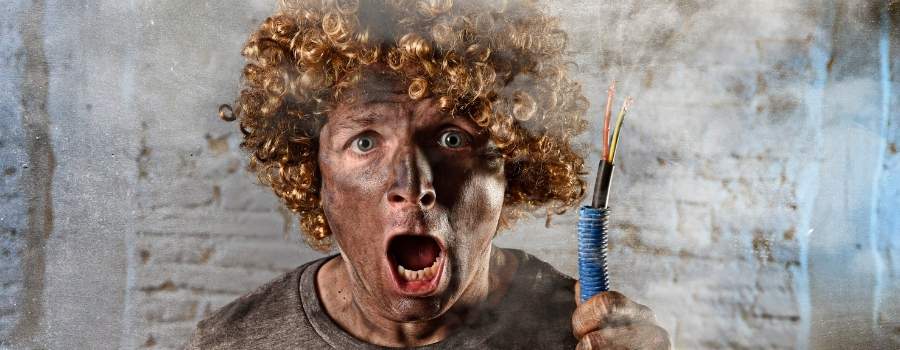Many of us would like a little extra lighting on our back decks and patios. For people with a pool or hot tub, a concern for getting shocked or electrocuted may have popped into your mind.
Can you get electrocuted by solar lights? There is almost no risk of getting electrocuted by solar lights. Most solar lighting is weatherproof, so the wires are insulated to prevent water from getting in. The current used by most solar-powered lighting isn’t high enough to reach a lethal threshold.
This isn’t to say that there is absolutely no risk involved with solar-powered lighting. Any time energy is stored and released you should be cautious and think about “what if” scenarios.
Can Solar Lights Electrocute You?
As I mentioned above, there is a negligible risk of being electrocuted or shocked by solar-powered lighting. They are typically made with LED lights, which require very little power to run. The casing and any wiring will be well insulated and waterproof.
Just having a string light fall into your swimming pool or hot tub poses virtually no danger.
That being said, I would advise that everyone stay away from the light and get out of the pool as quickly and calmly as possible. Then cut the power to the lights by unplugging it from its solar panel and then use a nonconductive pole (like a plastic pool cleaning net) to pull the string of lights out of the water. Let them dry thoroughly before plugging them back in and re-hanging them.
When you hang solar-powered strings lights or place solar garden path lights, these have small solar cells and battery storage.
These solar cells will produce about 1/2 of an amp of electricity. The good news here is that it takes 16+ milliamps to cause your muscles to contract … like when you grab an electric fence and your hand squeezes tighter… and 100 amps to cause your heart to go into fibrillation, meaning it throws your heartbeat out of sync or even stops it.
The story changes a bit when we start talking about lights that are hooked into your solar power grid. These are much bigger panels that are storing a lot more power in larger batteries…think car battery vs. 9-volt battery, put your tongue to one and it’s mildly tingly but put your tongue to the other and it’s downright deadly.
This is because a battery that’s used to store solar energy can push out 5 amps. Well beyond human tolerance.
Aside from the lighting having safety measures, your home should also have safety measures in place to cut the risk even further. As soon as a circuit is overloaded it will trip the circuit breaker, cutting power off to whatever is attached to it. This holds true for electronics running to solar panels as well.
Water just isn’t that great of a conductor of electricity. Electrical current moves around on charged ions within the water, of which there aren’t many. If you use a saltwater pool then these ions increase and could raise the potential for risk.
Be Cautious of Current, Not Voltage
There is a theory out there that says you could have one million volts traveling through you and be perfectly fine if the voltage is 1 amp.
I don’t want to test this theory, but it does make sense seeing as the voltage is akin to water pressure and current (or amperage) is like water flow rate. It takes a lot of water pressure to be lethal, but not much flow rate to be lethal. This is why floods don’t look like they move very fast but are extremely destructive.
Levels of Amperage vs. Human Tolerance
- 1 milliamp – Minor Annoyance.
- 16 milliamps – This level causes muscle constriction. Most can still voluntarily let go.
- 10 milliamps – Paralysis can occur in the respiratory system.
- 100 milliamps – Hear fibrillation.
- 2 amps (not milliamps, full amps) – Heart will stop, other organs will be damaged.
Ways To Keep Your Lighting In Good Shape And Your Family Safer
Anyone that has been in the military or worked in an industrial setting is familiar with the term “Preventative Maintenance.”
Preventative maintenance for your solar lighting can be as simple as walking your yard periodically and having a close look at the bulbs and wires. If you notice any cracks, gouges, or exposed wiring replace the light immediately.
While you’d still be at minimal risk for electrocution, you might be in for a small shock if you touch an exposed wire. But really, the bigger danger here is having damaged wiring that could lead to the battery pack overheating, melting, and posing a fire risk.
For more information on Solar Lighting and Fire Risks, check out this article I wrote.
If you live in an area that has long periods of snow coverage, then you might want to pull your solar lighting down and store it for the winter season. This is likely not necessary, but freezing temperatures and ground heave could damage your lighting and open them up for potential hazards in the future.
We all want to be thrifty where we can, but solar lighting isn’t an area where you should skimp. Cheaper lights are made with cheaper materials and have lower standards for manufacturing and safety.
Do some research on reputable brands and see what people have to say. Get online and check for any recalls or lawsuits. A few brands were recalled back in 2018 due to fire risks, but I wasn’t able to find any recalls due to shock and electrocution.
Solar Light Sensors: 5 Things The Experts Don’t Tell You
More Common Occurrences Of Outdoor Lighting Being Lethal?
Don’t use lights that are not intended for outdoor use. Remember, this lighting has to be designed to stand up to rain, wind, changing humidity, changing temperature, and any number of other events nature can throw at us.
We all want to be makers or tinkerers, but only purchase quality lighting from reputable stores and use it as it was designed to be used.
In other cases where people were electrocuted with outdoor lighting, it was usually pool lighting being improperly installed that was causing the problem.
The most common mistake made in these pool lighting incidences was that the lights were not installed to code and did not have a Ground Fault Circuit Interrupter (GFCI.)
A GFCI is a circuit breaker that will shut off power in about 1/40th of a second. A GFCI works by comparing the amount of current moving to and returning from the equipment as it passes through circuit conductors. If the amount ever differs by 5 milliamps, the GFCI will stop the current.
Pool electrocution caused by lighting is still a very rare occurrence but is more common than electrocution by solar-powered lighting.
Even in these cases is still not the lighting alone that’s the chief culprit, but the other equipment near the pool along with the lighting. The heater, the pumps, the metal handrails, and diving board rails. All of this, along with electricity that is installed wrong is what leads to tragedy.
To cut this risk, make sure that you are using 12-volt pool lights instead of 120-volt pool lights and ensure that they are installed by a licensed electrician who specializes in pool lighting.
If you’re interested in more information about the benefits of solar lighting and how to place them, check out these articles:
- 7 Benefits Of Using Outdoor Solar Lights
- How To Place Your Outdoor Solar Lights
- 7 Tips To Keep Your Solar Lights From Being Stolen

